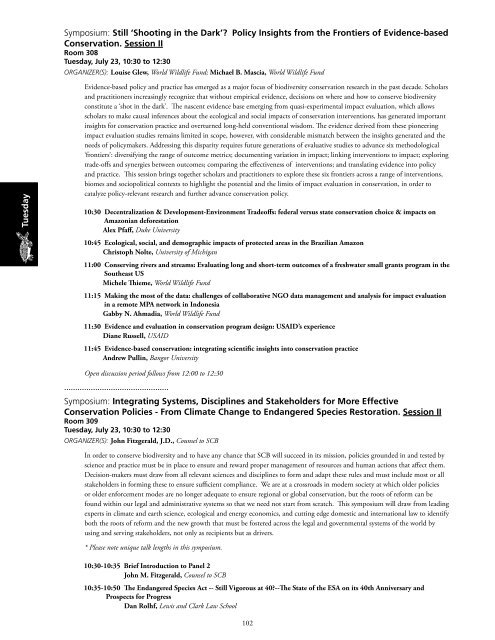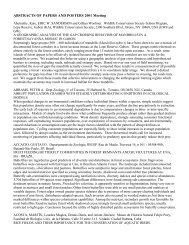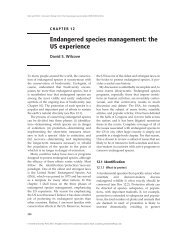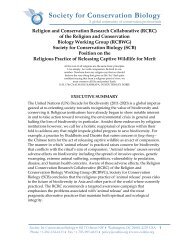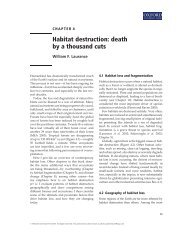ICCB 2013 Program - Society for Conservation Biology
ICCB 2013 Program - Society for Conservation Biology
ICCB 2013 Program - Society for Conservation Biology
Create successful ePaper yourself
Turn your PDF publications into a flip-book with our unique Google optimized e-Paper software.
Symposium: Still ‘Shooting in the Dark’ Policy Insights from the Frontiers of Evidence-based<br />
<strong>Conservation</strong>. Session II<br />
Room 308<br />
Tuesday, July 23, 10:30 to 12:30<br />
Organizer(s): Louise Glew, World Wildlife Fund; Michael B. Mascia, World Wildlife Fund<br />
Tuesday<br />
Evidence-based policy and practice has emerged as a major focus of biodiversity conservation research in the past decade. Scholars<br />
and practitioners increasingly recognize that without empirical evidence, decisions on where and how to conserve biodiversity<br />
constitute a ‘shot in the dark’. The nascent evidence base emerging from quasi-experimental impact evaluation, which allows<br />
scholars to make causal inferences about the ecological and social impacts of conservation interventions, has generated important<br />
insights <strong>for</strong> conservation practice and overturned long-held conventional wisdom. The evidence derived from these pioneering<br />
impact evaluation studies remains limited in scope, however, with considerable mismatch between the insights generated and the<br />
needs of policymakers. Addressing this disparity requires future generations of evaluative studies to advance six methodological<br />
‘frontiers’: diversifying the range of outcome metrics; documenting variation in impact; linking interventions to impact; exploring<br />
trade-offs and synergies between outcomes; comparing the effectiveness of interventions; and translating evidence into policy<br />
and practice. This session brings together scholars and practitioners to explore these six frontiers across a range of interventions,<br />
biomes and sociopolitical contexts to highlight the potential and the limits of impact evaluation in conservation, in order to<br />
catalyze policy-relevant research and further advance conservation policy.<br />
10:30 Decentralization & Development-Environment Tradeoffs: federal versus state conservation choice & impacts on<br />
Amazonian de<strong>for</strong>estation<br />
Alex Pfaff, Duke University<br />
10:45 Ecological, social, and demographic impacts of protected areas in the Brazilian Amazon<br />
Christoph Nolte, University of Michigan<br />
11:00 Conserving rivers and streams: Evaluating long and short-term outcomes of a freshwater small grants program in the<br />
Southeast US<br />
Michele Thieme, World Wildlife Fund<br />
11:15 Making the most of the data: challenges of collaborative NGO data management and analysis <strong>for</strong> impact evaluation<br />
in a remote MPA network in Indonesia<br />
Gabby N. Ahmadia, World Wildlife Fund<br />
11:30 Evidence and evaluation in conservation program design: USAID’s experience<br />
Diane Russell, USAID<br />
11:45 Evidence-based conservation: integrating scientific insights into conservation practice<br />
Andrew Pullin, Bangor University<br />
Open discussion period follows from 12:00 to 12:30<br />
...............................................<br />
Symposium: Integrating Systems, Disciplines and Stakeholders <strong>for</strong> More Effective<br />
<strong>Conservation</strong> Policies - From Climate Change to Endangered Species Restoration. Session II<br />
Room 309<br />
Tuesday, July 23, 10:30 to 12:30<br />
Organizer(s): John Fitzgerald, J.D., Counsel to SCB<br />
In order to conserve biodiversity and to have any chance that SCB will succeed in its mission, policies grounded in and tested by<br />
science and practice must be in place to ensure and reward proper management of resources and human actions that affect them.<br />
Decision-makers must draw from all relevant sciences and disciplines to <strong>for</strong>m and adapt these rules and must include most or all<br />
stakeholders in <strong>for</strong>ming these to ensure sufficient compliance. We are at a crossroads in modern society at which older policies<br />
or older en<strong>for</strong>cement modes are no longer adequate to ensure regional or global conservation, but the roots of re<strong>for</strong>m can be<br />
found within our legal and administrative systems so that we need not start from scratch. This symposium will draw from leading<br />
experts in climate and earth science, ecological and energy economics, and cutting edge domestic and international law to identify<br />
both the roots of re<strong>for</strong>m and the new growth that must be fostered across the legal and governmental systems of the world by<br />
using and serving stakeholders, not only as recipients but as drivers.<br />
* Please note unique talk lengths in this symposium.<br />
10:30-10:35 Brief Introduction to Panel 2<br />
John M. Fitzgerald, Counsel to SCB<br />
10:35-10:50 The Endangered Species Act -- Still Vigorous at 40--The State of the ESA on its 40th Anniversary and<br />
Prospects <strong>for</strong> Progress<br />
Dan Rolhf, Lewis and Clark Law School<br />
102


